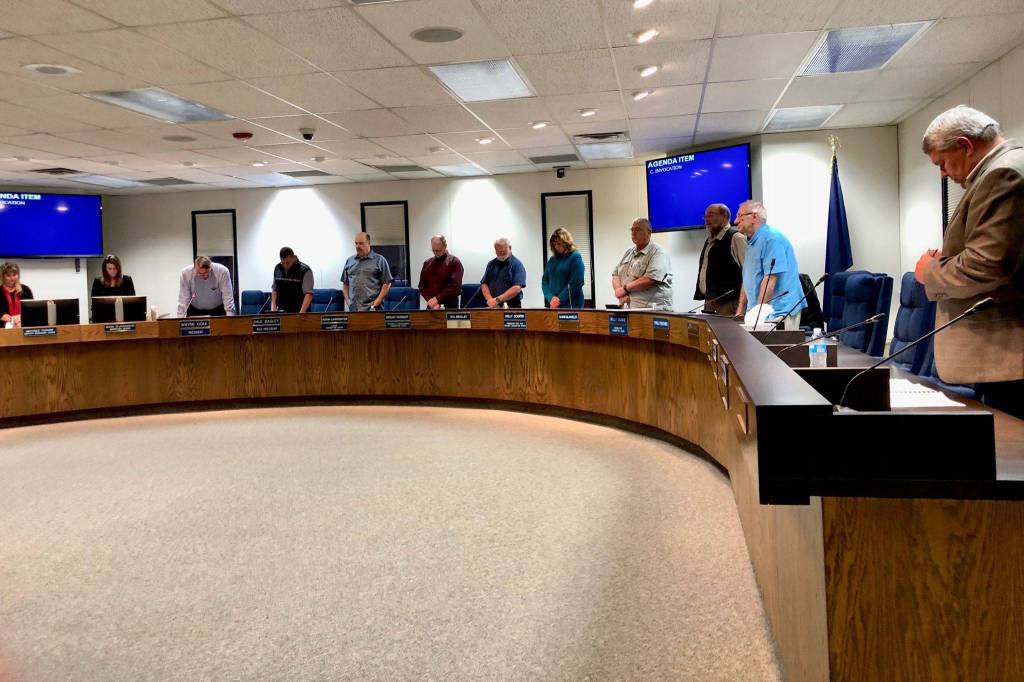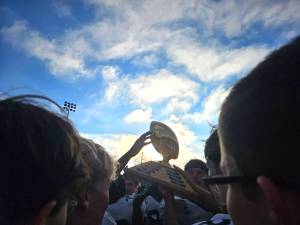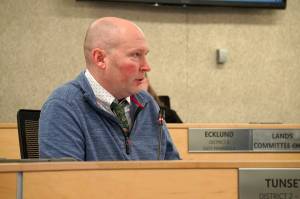KPB Assembly to consider invocation issue
Published 6:08 pm Wednesday, November 14, 2018
At its Nov. 20 meeting, the Kenai Peninsula Borough Assembly will consider two questions for its invocation policy:
• Should the assembly authorize the borough administration to appeal a decision by Anchorage Superior Court Judge Andrew Peterson ruling as unconstitutional the assembly’s policy for selecting invocation speakers?
• Or, should it adopt a new policy that allows any speakers to make an invocation and eliminates the criteria Peterson said violates the Alaska Constitution’s establishment clause?
On the agenda is Resolution 2018-053, which amends the invocation policy to make it constitutional, and Memorandum KPB-1949, whih authorizes an appeal. The memo appears on the agenda after the resolution, but assembly member Kelly Cooper of Homer said she will move to change the agenda so the appeal memo is considered first.
Cooper introduced the new invocation resolution, and Assembly President Wayne Ogle and Vice-President Dale Bagley joined her.
“Hopefully we can put this to bed and we can get back to what we’re supposed to be doing,” Cooper said of her resolution.
Last month, the borough lost a lawsuit against plaintiffs represented by the American Civil Liberties Union of Alaska in a fight over its invocation policy, which allows certain groups and individuals to offer an invocation at the beginning of each meeting. The plaintiffs, Lance Hunt, an atheist, Iris Fontana, a member of The Satanic Temple, and Elise Boyer, a member of the small Jewish community in Homer, all applied to give invocations after the policy was established in 2016. All three were denied because they did not belong to official organizations with an established presence on the peninsula. They sued and the ACLU Alaska agreed to represent them.
Peterson ruled the invocation policy, passed in 2016, violates the Alaska Constitution’s establishment clause, which is a mandate banning government from establishing an official religion or the favoring of one belief over another. Article 1, Section 4 of the constitution provides that “no law shall be made respecting an establishment of religion.”
“The Resolution is inclusive of tax-exempt religious associations serving residents of the borough,” Peterson wrote. “It is not inclusive of every religious view or belief practiced by the residents of the Kenai Peninsula.”
Peterson also granted a motion for summary judgment by the plaintiffs in Lance Hunt et al. v. Kenai Peninsula Borough and struck down the section of Resolution 2016-056 that was found unconstitutional — effectively leaving the borough with no policy to select people to deliver an invocation. The borough clerk also removed from the borough website a form to sign up and deliver an invocation. Assembly members have been giving invocations after Peterson’s decision, but at Tuesday’s meeting Keith Hamilton of Alaska Christian College will give the invocation. Hamilton had been approved under the old rules before Peterson struck them down.
Casey Reynolds, an ACLU Alaska spokesperson, pointed out that Peterson did not strike down the right of the borough to hold an invocation. The ACLU objected to what it and the plaintiffs felt was a discriminatory policy preventing some religious groups from giving an invocation.
“It’s literally 100 percent the ball in their court right now,” Reynolds said of where the assembly now stands.
The Ogle, Bagley and Cooper resolution would add these rules for an invocation:
• The word “prayer” is removed from the policy and replaced with the word “invocation,” defined as “a prayer or solemnizing message.”
• No one at an assembly meeting will be required to participate in an invocation.
• No official or borough employee may direct anyone in any way to participate in an invocation.
• The opportunity to give an invocation shall be done “in a way that is all-inclusive and diverse to represent the faiths of the residents of the Kenai Peninsula Borough.”
• No one seeking to deliver an invocation may do so at consecutive meetings or more than four meetings a year.
“My hope with the way I drafted it is a majority (of the assembly) can support it and move on,” Cooper said.
Bagley also submitted a memorandum saying he planned to introduce amendments to 2018-053 inserting whereas clauses noting that Judge Peterson ruled the invocation policy was unconstitutional, that the resolution would be an interim policy pending an appeal and that the old Resolution 2016-056 would go back into effect if the Alaska Supreme Court ruled it does not violate the Alaska Constitution.
Bagley’s amendments would in effect make the new rules temporary if the assembly voted to appeal Peterson’s decision.
The borough, represented by Anchorage-based attorney Kevin Clarkson, had defended its policy in the lawsuit. Clarkson works with the Alliance Defending Freedom, a Scottsdale, Arizona-based nonprofit that regularly litigates cases around the U.S. related to religious freedom, abortion and marriage rights. Through Clarkson, the Alliance Defending Freedom offered legal counsel to the borough and paid for part of the cost of its legal defense.
According to a records request filed by The Homer News and the Peninsula Clarion requesting exact figures for the expense of defending the lawsuit, the borough paid $26,88.246 to Brena, Bell and Clarkson, the Anchorage law firm where Clarkson works, from Jan. 31, 2017 to May 15, 2018. That does not include legal expenses covered by the Alliance Defending Freedom. The borough also paid $350.60 for travel and mileage.
In a letter to the Homer News this week, Assembly member Willy Dunne said the borough shouldn’t keep spending money to defend its former invocation policy.
“Not only have the actions of the Assembly caused divisiveness among our residents, they have also resulted in tens of thousands of dollars of taxpayer money being wasted on legal fees,” Dunne wrote. “…I hope we can all agree that throwing more money at the problem is unacceptable.”
Cooper said that the assembly will meet with the borough legal department in executive session before the Nov. 20 regular meeting and provide assembly members with more exact numbers of the legal costs.
Adding to the borough’s bill could be the legal expenses of the ACLU Alaska in its successful challenge of the invocation policy. Reynolds said the ACLU Alaska would be filing a motion to recover those expenses soon.
Cooper noted the irony that some people supporting the discriminatory invocation policy also tend to be fiscally conservative.
Reach Michael Armstrong at marmstrong@homernews.com.





